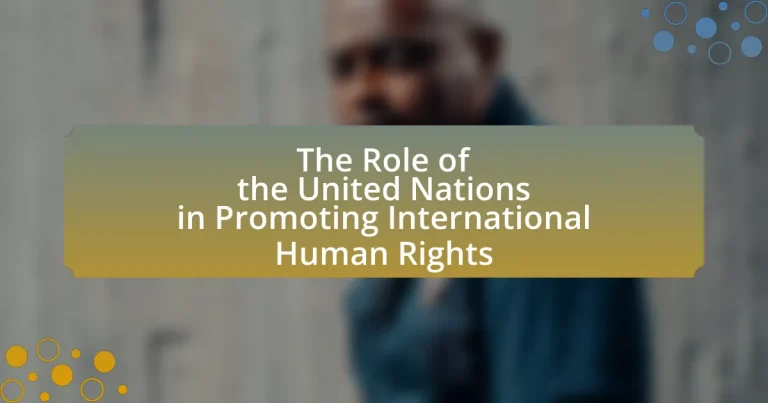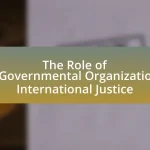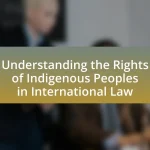The United Nations (UN) plays a pivotal role in promoting international human rights through the establishment of legal frameworks, monitoring compliance, and facilitating dialogue among member states. Key documents such as the Universal Declaration of Human Rights and various international covenants outline fundamental rights and obligations for nations. The UN Human Rights Council actively monitors global human rights situations, while initiatives like the Universal Periodic Review ensure accountability. Despite facing challenges such as political resistance and limited enforcement capabilities, the UN collaborates with regional organizations and civil society to enhance human rights protections and address emerging issues. The article explores the historical context, key functions, challenges, and future directions of the UN’s human rights efforts.
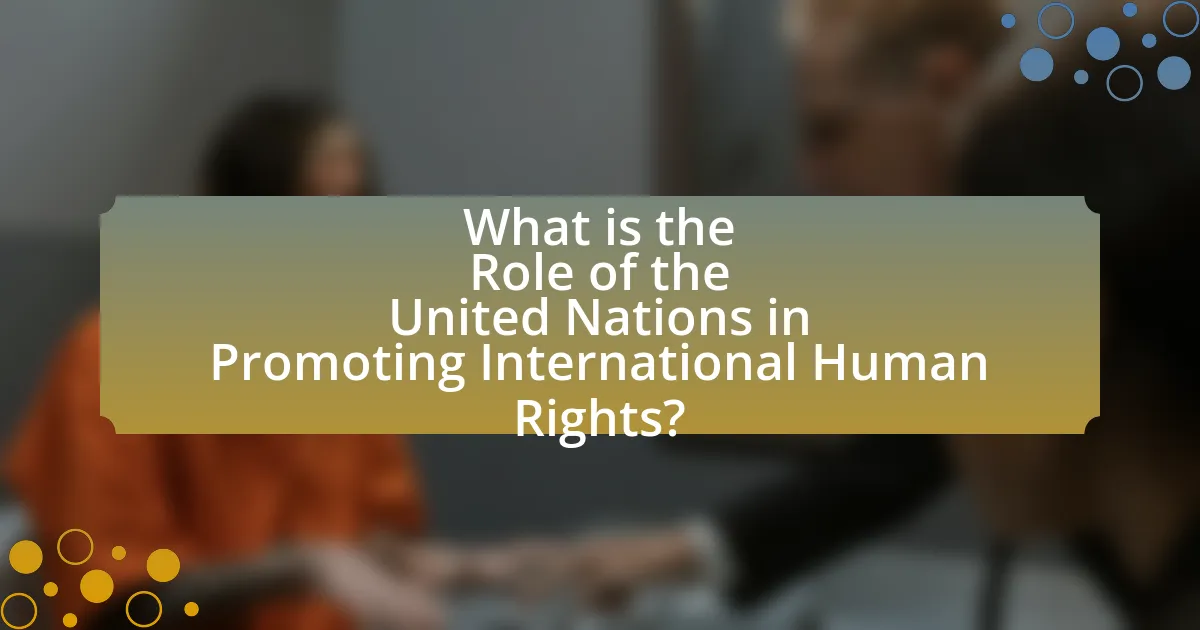
What is the Role of the United Nations in Promoting International Human Rights?
The United Nations plays a crucial role in promoting international human rights through the establishment of legal frameworks, monitoring compliance, and facilitating dialogue among member states. The UN adopted the Universal Declaration of Human Rights in 1948, which serves as a foundational document outlining fundamental rights and freedoms. Additionally, various treaties, such as the International Covenant on Civil and Political Rights and the International Covenant on Economic, Social and Cultural Rights, further codify these rights and obligate member states to uphold them. The UN Human Rights Council monitors human rights situations globally, conducts investigations, and issues reports to hold violators accountable. Furthermore, the UN engages in capacity-building initiatives and provides technical assistance to countries to strengthen their human rights practices.
How did the United Nations come to focus on human rights?
The United Nations came to focus on human rights primarily in response to the atrocities of World War II, which highlighted the need for a global framework to protect individual rights. In 1948, the UN General Assembly adopted the Universal Declaration of Human Rights, establishing a common standard for all nations to uphold. This declaration was influenced by the experiences of war and the desire to prevent future violations, reflecting a collective commitment to ensure dignity, freedom, and justice for all individuals.
What historical events led to the establishment of human rights norms within the UN?
The establishment of human rights norms within the UN was primarily influenced by the aftermath of World War II, particularly the atrocities committed during the war, which highlighted the need for a global framework to protect individual rights. In 1945, the formation of the United Nations aimed to prevent such horrors from recurring, leading to the adoption of the Universal Declaration of Human Rights in 1948. This declaration was a direct response to the widespread violations of human dignity observed during the war, as well as the Holocaust, which underscored the necessity for international standards to safeguard human rights. The UN General Assembly’s approval of the declaration marked a pivotal moment in codifying human rights norms, establishing principles that would guide member states in their treatment of individuals.
What key documents outline the UN’s commitment to human rights?
The key documents that outline the UN’s commitment to human rights include the Universal Declaration of Human Rights (UDHR), adopted in 1948, and the International Covenants on Civil and Political Rights and on Economic, Social and Cultural Rights, both adopted in 1966. The UDHR establishes fundamental human rights that are universally protected, while the two covenants further elaborate on the rights and obligations of states regarding civil, political, economic, social, and cultural rights. These documents collectively form the foundation of international human rights law and reflect the UN’s commitment to promoting and protecting human rights globally.
What are the main functions of the United Nations in this area?
The main functions of the United Nations in promoting international human rights include establishing international human rights standards, monitoring compliance, providing technical assistance, and facilitating dialogue among member states. The UN creates treaties such as the Universal Declaration of Human Rights and the International Covenant on Civil and Political Rights, which set benchmarks for human rights practices globally. Additionally, the UN conducts periodic reviews of member states’ human rights records through mechanisms like the Universal Periodic Review, ensuring accountability. The UN also offers support and training to countries to help them implement human rights norms effectively, exemplified by initiatives from the Office of the High Commissioner for Human Rights. These functions collectively aim to uphold and advance human rights worldwide.
How does the UN monitor human rights violations globally?
The United Nations monitors human rights violations globally through various mechanisms, including special rapporteurs, treaty bodies, and the Universal Periodic Review. Special rapporteurs are independent experts appointed to report on specific human rights issues, providing detailed assessments and recommendations based on their findings. Treaty bodies, which consist of committees of independent experts, review the compliance of member states with international human rights treaties, issuing periodic reports and recommendations. The Universal Periodic Review is a unique process that involves the review of the human rights records of all UN member states every four years, allowing for the assessment of progress and identification of areas needing improvement. These mechanisms collectively enable the UN to gather information, raise awareness, and hold states accountable for human rights violations.
What mechanisms does the UN use to promote human rights education?
The United Nations promotes human rights education through various mechanisms, including the Universal Declaration of Human Rights, the establishment of the Office of the High Commissioner for Human Rights, and the implementation of the World Programme for Human Rights Education. The Universal Declaration of Human Rights, adopted in 1948, serves as a foundational document that outlines fundamental human rights and encourages educational initiatives globally. The Office of the High Commissioner for Human Rights provides guidance and support to member states in integrating human rights education into their national curricula. Additionally, the World Programme for Human Rights Education, launched in 2005, aims to promote human rights education in schools, universities, and other educational settings, emphasizing the importance of awareness and understanding of human rights principles. These mechanisms collectively enhance the global commitment to human rights education and awareness.
What challenges does the United Nations face in promoting human rights?
The United Nations faces significant challenges in promoting human rights, primarily due to political resistance from member states. Many countries prioritize national sovereignty over international human rights obligations, leading to non-compliance with UN resolutions. For instance, in 2021, the UN Human Rights Council faced pushback from nations like China and Russia regarding investigations into human rights abuses, illustrating the difficulty of holding states accountable. Additionally, limited resources and funding constraints hinder the UN’s ability to effectively monitor and enforce human rights standards globally. The complexity of cultural differences and varying interpretations of human rights further complicates the UN’s efforts, as seen in debates over issues such as freedom of expression versus cultural norms.
How do political interests of member states impact the UN’s effectiveness?
Political interests of member states significantly impact the UN’s effectiveness by influencing decision-making processes and the implementation of resolutions. For instance, the Security Council’s ability to act is often hindered by the veto power held by its five permanent members, which allows them to block actions that do not align with their national interests. This was evident during the Syrian civil war, where geopolitical interests led to inaction on critical humanitarian interventions. Additionally, member states may prioritize their own political agendas over collective goals, resulting in selective engagement with human rights issues, as seen in the varying responses to human rights violations in different countries based on strategic alliances. Such dynamics can lead to a lack of consensus and diminished credibility of the UN in promoting international human rights effectively.
What are the limitations of the UN’s enforcement capabilities regarding human rights?
The UN’s enforcement capabilities regarding human rights are limited primarily by its reliance on member states for compliance and the lack of a standing enforcement mechanism. The UN can issue resolutions and condemn violations, but it cannot unilaterally enforce its decisions without the cooperation of sovereign nations. For instance, the UN Security Council can impose sanctions or authorize military intervention, but such actions often require consensus among its five permanent members, which can lead to inaction in cases where political interests conflict. Additionally, the UN’s human rights bodies, such as the Human Rights Council, can investigate and report on abuses, but they lack the authority to compel states to act on their findings. This structural limitation is evident in situations like the ongoing human rights abuses in Syria, where despite extensive documentation and condemnation, effective enforcement remains elusive due to geopolitical complexities.
How does the United Nations collaborate with other organizations to enhance human rights?
The United Nations collaborates with other organizations to enhance human rights through partnerships, joint initiatives, and coordinated efforts. For instance, the UN works closely with non-governmental organizations (NGOs) and regional bodies like the African Union and the European Union to implement human rights treaties and monitor compliance. This collaboration is evident in the Universal Periodic Review process, where the UN Human Rights Council engages with various stakeholders, including civil society, to assess human rights situations in member states. Additionally, the UN collaborates with specialized agencies such as UNICEF and WHO to address specific human rights issues, such as children’s rights and health-related rights, thereby ensuring a comprehensive approach to human rights promotion and protection.
What role do non-governmental organizations play in supporting the UN’s efforts?
Non-governmental organizations (NGOs) play a crucial role in supporting the UN’s efforts by advocating for human rights, providing expertise, and facilitating grassroots participation. NGOs contribute to the UN’s mission by monitoring human rights violations, reporting findings, and holding governments accountable, which enhances the UN’s ability to address issues effectively. For instance, organizations like Amnesty International and Human Rights Watch regularly submit reports to UN bodies, influencing policy decisions and promoting international standards. Additionally, NGOs often mobilize public opinion and resources, amplifying the UN’s initiatives and fostering collaboration among various stakeholders.
How does the UN partner with regional organizations to address human rights issues?
The UN partners with regional organizations by collaborating on human rights initiatives, sharing resources, and coordinating efforts to enhance the protection of human rights. For instance, the UN works closely with the African Union and the Organization of American States to implement human rights treaties and monitor compliance within their respective regions. This partnership is evidenced by joint missions, such as the UN-AU Hybrid Operation in Darfur, which combines resources and expertise to address human rights violations effectively. Additionally, the UN provides technical assistance and capacity-building support to regional organizations, enabling them to strengthen their human rights frameworks and mechanisms.
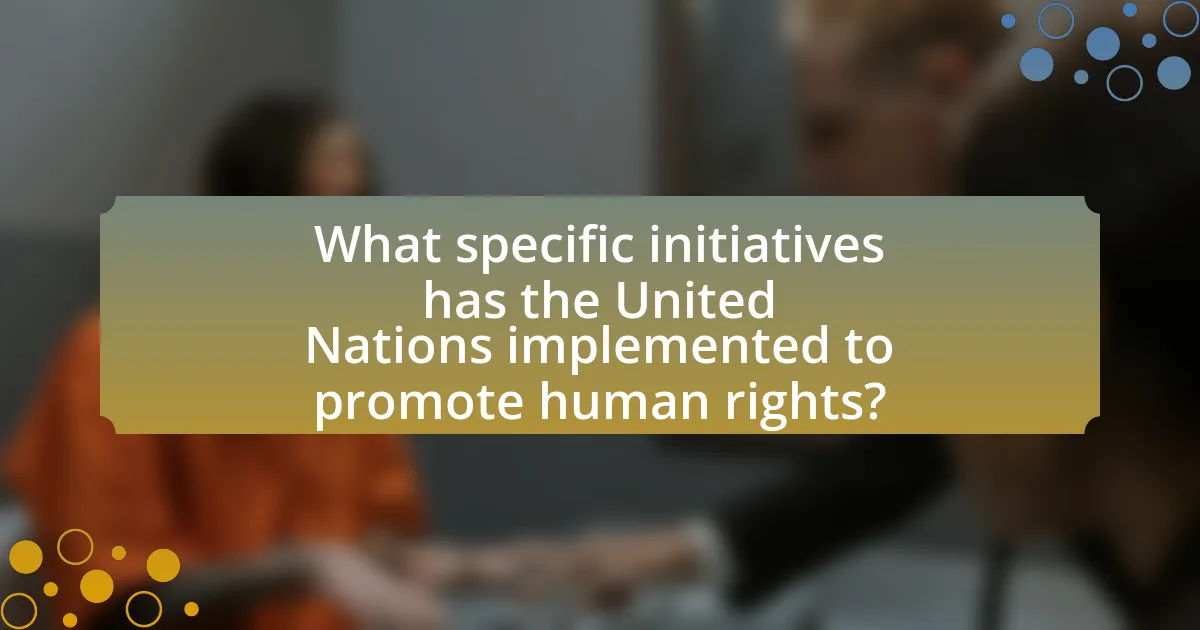
What specific initiatives has the United Nations implemented to promote human rights?
The United Nations has implemented several specific initiatives to promote human rights, including the establishment of the Universal Declaration of Human Rights in 1948, which sets fundamental human rights standards. Additionally, the UN Human Rights Council, created in 2006, conducts reviews of human rights practices in member states and addresses violations through resolutions and recommendations. The UN also supports various human rights treaties, such as the International Covenant on Civil and Political Rights and the Convention on the Elimination of All Forms of Discrimination Against Women, which obligate states to uphold specific rights. Furthermore, the UN conducts human rights monitoring and reporting through mechanisms like the Universal Periodic Review, which assesses the human rights records of all member states every four years. These initiatives collectively reinforce the UN’s commitment to promoting and protecting human rights globally.
What are the key programs and agencies involved in human rights promotion?
The key programs and agencies involved in human rights promotion include the United Nations Human Rights Council (UNHRC), the Office of the United Nations High Commissioner for Human Rights (OHCHR), and various treaty bodies such as the Human Rights Committee. The UNHRC is responsible for promoting and protecting human rights globally, while the OHCHR provides support and guidance to countries in implementing human rights standards. Additionally, treaty bodies monitor compliance with international human rights treaties, ensuring accountability and adherence to human rights norms. These entities collectively work to advance human rights through mechanisms such as reporting, monitoring, and capacity-building initiatives.
How does the Office of the High Commissioner for Human Rights operate?
The Office of the High Commissioner for Human Rights operates by promoting and protecting human rights globally through monitoring, reporting, and advocacy. It engages with governments, civil society, and international organizations to ensure compliance with human rights standards, as established by international treaties and conventions. The Office conducts investigations into human rights violations, provides technical assistance and capacity-building to states, and raises awareness about human rights issues. It also prepares reports for the United Nations Human Rights Council and other bodies, facilitating dialogue and accountability. This operational framework is supported by the Office’s mandate, which is derived from the United Nations General Assembly and the Human Rights Council resolutions.
What initiatives have been launched to protect vulnerable populations?
The United Nations has launched several initiatives to protect vulnerable populations, including the establishment of the UN Human Rights Council and the implementation of the Sustainable Development Goals (SDGs). The UN Human Rights Council, created in 2006, focuses on addressing human rights violations and promoting accountability, particularly for marginalized groups such as refugees, women, and children. The SDGs, adopted in 2015, include specific targets aimed at reducing inequalities and ensuring social protection for vulnerable populations, with Goal 10 explicitly addressing the need to reduce inequality within and among countries. These initiatives are supported by various UN agencies, such as UNICEF and UNHCR, which provide resources and advocacy to safeguard the rights of these populations.
What impact have UN initiatives had on global human rights standards?
UN initiatives have significantly elevated global human rights standards by establishing comprehensive frameworks and norms that member states are encouraged to adopt. The Universal Declaration of Human Rights, adopted in 1948, serves as a foundational document that outlines fundamental rights and freedoms, influencing national constitutions and laws worldwide. Additionally, various treaties and conventions, such as the International Covenant on Civil and Political Rights and the Convention on the Elimination of All Forms of Discrimination Against Women, have set binding obligations for countries, promoting accountability and compliance. The UN’s periodic review mechanisms, like the Universal Periodic Review, further ensure that states are held accountable for their human rights practices, thereby fostering a culture of respect for human rights globally.
How have UN resolutions influenced national laws regarding human rights?
UN resolutions have significantly influenced national laws regarding human rights by establishing international standards that countries are encouraged to adopt. For instance, the Universal Declaration of Human Rights, adopted by the UN General Assembly in 1948, has served as a foundational document that many nations reference when drafting or amending their own human rights legislation. Additionally, various UN treaties, such as the International Covenant on Civil and Political Rights, require signatory states to align their domestic laws with the obligations outlined in these agreements, leading to legal reforms in areas such as anti-discrimination, freedom of expression, and the rights of marginalized groups. Countries that have ratified these treaties often report changes in their legal frameworks to comply with international norms, demonstrating the direct impact of UN resolutions on national legislation.
What success stories can be attributed to UN human rights interventions?
UN human rights interventions have led to significant success stories, including the establishment of the International Criminal Court (ICC) and the promotion of the Universal Declaration of Human Rights. The ICC, created in 2002, has successfully prosecuted individuals for war crimes, genocide, and crimes against humanity, thereby reinforcing accountability for human rights violations. Additionally, the Universal Declaration of Human Rights, adopted in 1948, has served as a foundational document influencing national laws and international treaties, promoting the protection of human rights globally. These interventions have contributed to the advancement of human rights standards and the establishment of legal frameworks that hold violators accountable.
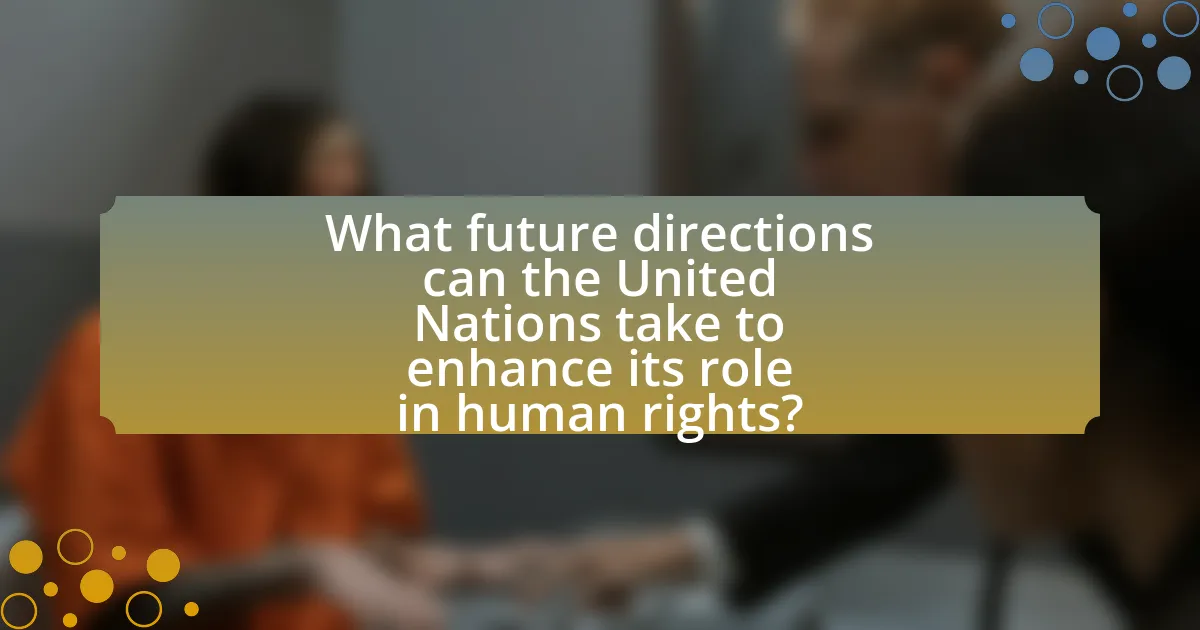
What future directions can the United Nations take to enhance its role in human rights?
The United Nations can enhance its role in human rights by strengthening its mechanisms for accountability and enforcement. This can be achieved by increasing the capacity of the Human Rights Council to investigate violations and hold perpetrators accountable, as evidenced by the establishment of independent commissions of inquiry that have successfully documented abuses in conflict zones. Additionally, the UN can expand its partnerships with regional organizations to promote human rights initiatives, leveraging local knowledge and resources to address specific challenges. For instance, collaboration with the African Union has led to significant advancements in human rights protections across the continent. Furthermore, the UN should prioritize the integration of human rights into all its development programs, ensuring that economic and social policies are aligned with human rights standards, as highlighted in the 2030 Agenda for Sustainable Development.
How can the UN adapt to emerging human rights challenges?
The UN can adapt to emerging human rights challenges by enhancing its monitoring mechanisms and increasing collaboration with civil society organizations. Strengthening data collection and analysis allows the UN to identify trends and respond proactively to human rights violations. For instance, the UN Human Rights Council has established special procedures and independent experts to address specific issues, such as the rights of marginalized groups, which demonstrates a responsive approach to evolving challenges. Additionally, the UN can leverage technology to improve communication and reporting, ensuring timely interventions in crises. This adaptability is crucial as global issues like digital privacy and climate change increasingly intersect with human rights, necessitating a dynamic and informed response from the UN.
What role does technology play in advancing human rights initiatives?
Technology plays a crucial role in advancing human rights initiatives by enabling better communication, data collection, and advocacy efforts. For instance, social media platforms allow activists to mobilize support and raise awareness about human rights violations in real-time, as seen during the Arab Spring, where platforms like Twitter and Facebook were instrumental in organizing protests. Additionally, technology facilitates the documentation of abuses through tools such as mobile apps and satellite imagery, which provide evidence for accountability and legal action. Reports from organizations like Human Rights Watch highlight how digital tools have transformed the landscape of human rights advocacy, making it more accessible and impactful.
How can the UN strengthen its response to human rights abuses in conflict zones?
The UN can strengthen its response to human rights abuses in conflict zones by enhancing its monitoring and reporting mechanisms. By deploying more human rights observers and utilizing advanced technology for real-time data collection, the UN can better document violations. For instance, the UN Human Rights Council has established commissions of inquiry that provide detailed reports on abuses, which can lead to accountability measures. Additionally, increasing collaboration with local NGOs and civil society organizations can improve information flow and support grassroots efforts. Historical examples, such as the UN’s response to the Syrian conflict, demonstrate that timely and accurate reporting can mobilize international action and pressure violators.
What best practices can be adopted to improve the UN’s effectiveness in promoting human rights?
To improve the UN’s effectiveness in promoting human rights, adopting a multi-faceted approach that includes strengthening accountability mechanisms, enhancing collaboration with civil society, and increasing funding for human rights initiatives is essential. Strengthening accountability mechanisms, such as the Universal Periodic Review, ensures that member states are held responsible for their human rights obligations, as evidenced by the increased compliance rates among countries that undergo regular reviews. Enhancing collaboration with civil society organizations allows for grassroots perspectives to inform UN policies, which has been shown to lead to more effective human rights interventions. Additionally, increasing funding for human rights initiatives enables the UN to implement more comprehensive programs, as demonstrated by the success of the UN Human Rights Council’s projects that have received adequate financial support.
How can member states better support the UN’s human rights agenda?
Member states can better support the UN’s human rights agenda by actively implementing and enforcing international human rights treaties and conventions. By ratifying these treaties, such as the International Covenant on Civil and Political Rights, member states commit to uphold specific human rights standards. Furthermore, they can enhance their support by providing financial and logistical resources to UN human rights mechanisms, such as the Human Rights Council and various treaty bodies, which rely on member state contributions for their operations. For instance, in 2021, the UN reported that increased funding from member states led to improved monitoring and reporting on human rights violations globally. Additionally, member states should engage in constructive dialogue with the UN and other nations to share best practices and collaborate on human rights initiatives, thereby fostering a collective commitment to uphold human rights standards worldwide.
What strategies can enhance collaboration between the UN and civil society?
Enhancing collaboration between the UN and civil society can be achieved through inclusive dialogue, capacity building, and joint initiatives. Inclusive dialogue ensures that civil society organizations are actively involved in decision-making processes, which fosters trust and transparency. Capacity building programs equip civil society with the necessary skills and resources to engage effectively with UN mechanisms, as evidenced by the UN’s support for training workshops that have improved advocacy efforts. Joint initiatives, such as collaborative projects on human rights issues, create shared goals and leverage the strengths of both entities, exemplified by partnerships in areas like sustainable development and humanitarian response. These strategies collectively strengthen the relationship between the UN and civil society, promoting a more effective approach to international human rights advocacy.
